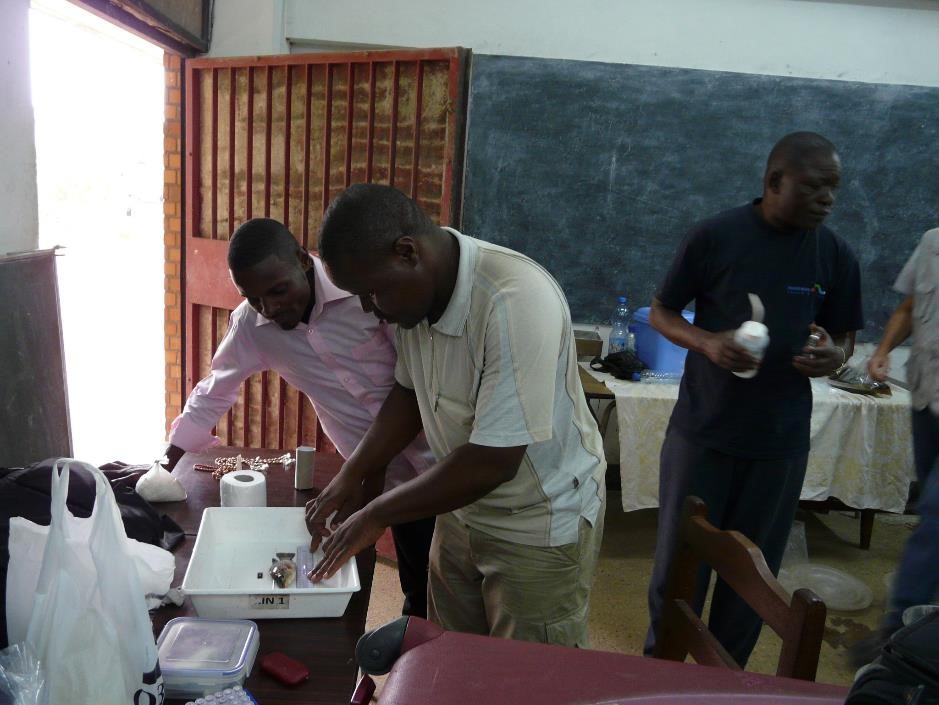 CEBioS workshop in fish biology and parasitology in D. R. Congo
CEBioS workshop in fish biology and parasitology in D. R. Congo
From June 18th until July 4th, CEBioS scientist Maarten Vanhove undertook a mission to the D.R.Congo. The main part of the mission was taken up by a capacity building workshop in fish biology and parasitology, entitled 'Un atelier ichtyo(parasito)logique au Bas-Congo en appui à un réseau centrafricain en ichtyoparasitologie et pour le renforcement de la collaboration scientifique au sein de la R.D.Congo.'
| Release date | 31/08/2015 |
|---|---|
| Contributor | mlsusini |
| Geographical coverage | Congo, |
| Keywords | parasitology, fish biology, |
The workshop was hosted by Prof. Dr. Soleil Wamuini Lunkayilakio from the Institut Supérieur Pédagogique (ISP) de Mbanza-Ngungu, for members of this institute’s departments of biology and agronomy/veterinary medicine. Participants also included delegates from other institutions: the Institut National pour l'Etude et la Recherche Agronomiques – Mvuazi, the Institut Supérieur d'études agronomiques – Mvuazi, Université Kongo and the Muilu Kiawanga school.
During this training, the focus was on practical techniques for studying fishes and their parasites, including isolating, mounting and identifying a range of parasite taxa. A stereoscope, a trinocular microscope with digital camera and other items for microscopy were donated to the ISP, and immediately put to the test.
Given the match with the Belspo BRAIN-be pioneer project TILAPIA (Tracing fish Introductions and LAteral Parasite transfer to Indigenous Aquatic fauna) (RMCA: Dr. Tine Huyse, Prof. Dr. Jos Snoeks) special attention was devoted to potential co-introduction of parasites with introduced Nile tilapia.

Apart from Maarten, the workshop was taught by Dr. Antoine Pariselle (Institut de Recherche pour le Développement, Cameroon) and Fidel Muterezi Bukinga (Centre de Recherche en Hydrobiologie–Uvira). The intention is indeed to focus in networking and partnerships within the D.R.Congo and throughout Central Africa.
Another goal of the mission was to follow up on existing collaborations, and explore the possibilities for new ones, with a host of partner institutions in the D.R.Congo, such as the Institution Congolais pour la Conservation de la Nature (ICCN: headquarters, Parc Marin des Mangroves, Jardin Botanique de Kisantu); the Belgian embassy; the Flemish Association for Development Cooperation and Technical Assistance (VVOB vzw); the Ministère de l'Environnement, Conservation de la Nature et Tourisme; the École Régionale Post-Universitaire d'Aménagement et de Gestion Intégrés des Forêts et Territoires Tropicaux (ERAIFT); and the Université de Kinshasa (UNIKIN).
This mission was co-organised between the Royal Museum for Central Africa and the Royal Belgian Institute for Natural Sciences and funded by their respective development cooperation (DGD) programs.
Please note that this information has expired.
 This site uses cookies in order to function as expected. By continuing, you are agreeing to our
This site uses cookies in order to function as expected. By continuing, you are agreeing to our 




